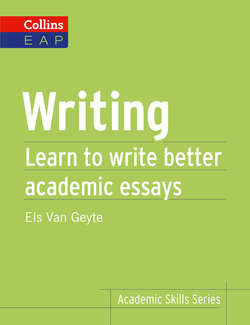Читать книгу Writing: B2+ - Els Geyte Van - Страница 32
Оглавление4 Formality, efficiency, modesty and clarity
Aims
understand formality in register and style
understand efficiency in register and style
understand modesty in register and style
understand clarity in register and style
Quiz
Self-evaluation
For each statement below, circle the word which is true for you.
| 1 I often use words like ‘big’, ‘good’, ‘a lot’ in my essays. | agree | disagree | not sure |
| 2 It is generally acceptable to use idioms and contractions in academic writing. | agree | disagree | not sure |
| 3 I always proofread my essays to make sure I haven’t repeated myself. | agree | disagree | not sure |
| 4 I know how to use cautious and impersonal language to make my writing modest. | agree | disagree | not sure |
| 5 It is acceptable to use words like ‘thing’, ‘kind of’, ‘stuff’ in academic writing. | agree | disagree | not sure |
| 6 I feel I need to write long and complex sentences to write in an academic style. | agree | disagree | not sure |
Four principles of academic writing
In Chapter 2 we looked at what the person marking your work wants. One aspect of this is that you need to demonstrate that you understand the conventions of the academic genre.
In this chapter we will be looking at what all academic readers want, i.e. the type of register and style that is expected from all scholars.
We will look at four principles of academic writing: Formality, Efficiency, Modesty, and Clarity, and consider what they mean for the academic writer. For each principle, you will find examples of mistakes students have made, followed by explanations and corrections. Try to work out what the mistakes are and how you could correct them before you read on.
Glossary
genre (genres) N-COUNT A genre is a particular type of literature, painting, music, film, or other art form which people consider as a class because it has special characteristics.
Formality
Before starting university, students are already aware of the need for formal language in essays. The problem is that it can be difficult to know what is formal and what is not. You can try to think about it in this way: words that are used a lot when speaking (e.g. ‘big’, ‘good’, ‘well’, ‘a lot’), or a technique that is used a lot in speeches (e.g. asking the audience questions) are unlikely to be used in formal writing.
Glossary
formality N-UNCOUNT If you talk about the formality of a person’s language or writing style, you mean that they are using extremely formal academic language.
What else can we expect from the internet? The first thing which we expect and hope to have is an improvement of the services in the near future.
The student asks a question here and then answers it. This is a technique used in speeches to involve the audience. In academic writing, the writer does not address the audience. An improvement would be: ‘The future of the internet will be decided by the needs of its customers. One development is therefore likely to be service improvement.’ This takes out the question, the word ‘hope’, which is quite personal, and the need for ‘we’, which refers to internet customers.
Secondly, we need to reduce the internet service access fees. Moreover, there are always technological developments in the pipeline.
This follows on from the previous text about the internet, so we can avoid the ‘we’ by saying ‘Another customer requirement is a reduction in access fees.’ The second sentence contains an idiom, ‘in the pipeline’, which means ‘in the process of being completed, delivered, or produced’. Idioms are very rare in academic writing, and it is better if you don’t use them. The sentence could be improved as follows:
‘Technological advances can also be expected, as companies are always developing their systems in order to stay competitive.’
Analysis of annual financial reports is an art, which involves many complexities. Even when they are looking at the same natural beauty, amateur painters and great masters will have completely different interpretations. Different people might obtain different conclusions when reading the same report.
This student is using an analogy: financial analysis is compared to an art form with many complexities. It is not wrong to use an analogy, as it involves comparison, which is an academic skill. However, analogy and metaphor can be quite poetic in nature, in which case they are not academic. The student is going too far in the second sentence. An improvement would be: ‘The analysis of financial reports can be said to have more in common with art than with science, as it relies on interpretation and not just facts. This is why different analysts may reach different conclusions.’
